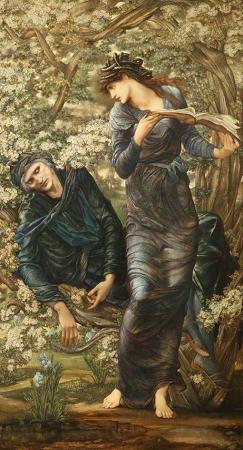Merlin. Merlin is a legendary figure best known as an enchanter or wizard featured in Arthurian legend and medieval Welsh poetry. The standard depiction of the character first appears in Geoffrey of Monmouth's Historia Regum Britanniae, written c. 1136, and is based on an amalgamation of previous historical and legendary figures. Geoffrey combined existing stories of Myrddin Wyllt, a North Brythonic prophet and madman with no connection to King Arthur, with tales of the Romano-British war leader Ambrosius Aurelianus to form the composite figure he called Merlin Ambrosius. Geoffrey's rendering of the character was immediately popular, especially in Wales. Later writers in France and elsewhere expanded the account to produce a fuller image, creating one of the most important figures in the imagination and literature of the Middle Ages. Merlin's traditional biography casts him as a cambion: born of a mortal woman, sired by an incubus, the non-human from whom he inherits his supernatural powers and abilities. Merlin matures to an ascendant sagehood and engineers the birth of Arthur through magic and intrigue. Later authors have Merlin serve as the king's advisor and mentor until he disappears from the story after having been bewitched and forever sealed or killed by the Lady of the Lake after falling madly in love with her. He is popularly said to be buried in the magical forest of Broceliande. The name Merlin is derived from the Welsh Myrddin, the name of the bard who was one of the chief sources for the later legendary figure. Geoffrey of Monmouth Latinised the name to Merlinus in his works. Medievalist Gaston Paris suggests that Geoffrey chose the form Merlinus rather than the regular Merdinus to avoid a resemblance to the Anglo-Norman word merde for feces. Clas Myrddin or Merlin's Enclosure is an early name for Great Britain stated in the Third Series of Welsh Triads. Celticist A. O. H. Jarman suggests that the Welsh name Myrddin was derived from the toponym Caerfyrddin, the Welsh name for the town known in English as Carmarthen. This contrasts with the popular folk etymology that the town was named after the bard. The name Carmarthen is derived from the town's previous Roman name Moridunum, in turn derived from Celtic Brittonic moridunon, sea fortress. Geoffrey's composite Merlin is based primarily on the legendary madman poet and seer Myrddin Wyllt, and Emrys, a fictional character based in part on the 5th-century historical war leader Ambrosius Aurelianus who was mentioned in one of Geoffrey's primary sources, the early 9th-century Historia Brittonum. The former had nothing to do with King Arthur: in British poetry he was a bard driven mad after witnessing the horrors of war, who fled civilization to become a wild man of the wood in the 6th century. Geoffrey had Myrddin Wyllt in mind when he wrote his earliest surviving work, the Prophetiae Merlini, which he claimed were the actual words of the legendary poet and madman. Geoffrey's Prophetiae do not reveal much about Merlin's background. He included the prophet in his next work, Historia Regum Britanniae, supplementing the characterisation by attributing to him stories about Aurelius Ambrosius, taken from Nennius' Historia Brittonum. According to Nennius, Ambrosius was discovered when the British king Vortigern was trying to erect a tower. The tower always collapsed before completion, and his wise men told him that the only solution was to sprinkle the foundation with the blood of a child born without a father. Ambrosius was rumoured to be such a child but, when brought before the king, he revealed the real reason for the tower's collapse: below the foundation was a lake containing two dragons who fought a battle representing the struggle between the invading Saxons and the native Celtic Britons. Geoffrey retells this story in his Historia Regum Britanniae with some embellishments, and gives the fatherless child the name of the prophetic bard Merlin. He keeps this new figure separate from Aurelius Ambrosius and, with regard to his changing of the original Nennian character, he states that Ambrosius was also called Merlin, that is, Ambrosius Merlinus. He goes on to add new episodes that tie Merlin with King Arthur and his predecessors. Geoffrey's account of Merlin Ambrosius' early life in the Historia Regum Britanniae is based on the tale of Ambrosius in the Historia Brittonum. He adds his own embellishments to the tale, which he sets in Carmarthen, Wales. While Nennius' Ambrosius eventually reveals himself to be the son of a Roman consul, Geoffrey's Merlin is begotten on a king's daughter by an incubus demon.
more...





